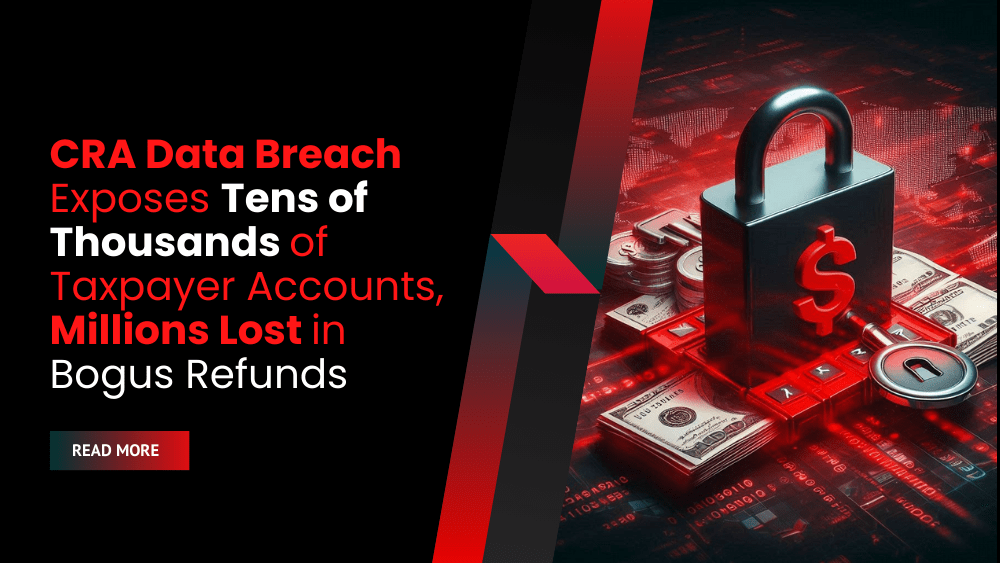A joint investigation by The Fifth Estate and Radio-Canada has uncovered the CRA data breach affecting tens of thousands of Canadian taxpayers and resulting in millions of dollars in fraudulent refunds. The investigation reveals a systemic failure within the Canada Revenue Agency (CRA) to adequately protect taxpayer data and prevent sophisticated cyberattacks. The scale of the problem, significantly underreported to Parliament, raises serious concerns about the CRA’s security measures and its transparency.
The H&R Block Data Breach: How it Happened
The investigation highlights a significant data breach involving H&R Block Canada, one of the country’s largest tax preparation firms. Hackers gained access to H&R Block’s confidential CRA e-filing credentials, allowing them to access hundreds of Canadian taxpayers’ accounts. These hackers manipulated direct deposit information, submitted fraudulent tax returns, and successfully claimed over $6 million in bogus refunds. One particularly illustrative example involved a fraudulent return using a legitimate postal code but a fake address on a non-existent “Tomato Street.”
Despite H&R Block’s assertion that its systems were not compromised, the evidence strongly suggests that stolen credentials facilitated the fraudulent activity. The CRA, while ruling out a breach of its own systems or insider involvement, has yet to identify the source of the hack. This lack of accountability underscores the vulnerability of the CRA’s systems and the significant challenges in tracking down perpetrators of these complex cybercrimes.
Associate tax professor André Lareau of Laval University aptly summarized the situation:
“Obviously the door is open and some people are infiltrating the system, but the CRA does not seem to have found the key to lock the door.”
This statement encapsulates the core issue: the CRA’s failure to effectively secure taxpayer data, leaving the door open to exploitation by sophisticated cybercriminals. The CRA data breach settlement, should one occur, will likely be substantial given the scale of the financial losses and the number of individuals affected.
Vast Underreporting of CRA Data Breaches to Parliament: A Systemic Issue
The H&R Block incident is just one piece of a much larger puzzle. The investigation reveals a staggering underreporting of CRA data breaches to Parliament. While the Privacy Commissioner’s June 2024 report to Parliament listed only 71 breaches, the CRA subsequently admitted to over 31,468 material privacy breaches between March 2020 and December 2023, impacting 62,000 individual taxpayers. This massive discrepancy raises serious questions about the CRA’s commitment to transparency and its accountability to Parliament. The CRA data breach settlement negotiations, if any, will need to address this significant lapse in reporting.
The CRA attributed the sharp increase in breaches to the introduction of COVID-19 emergency benefits in 2020. However, the agency’s explanation fails to address the fundamental security flaws that allowed these breaches to occur on such a massive scale. The agency’s statement that it “takes the protection of Canadians’ tax information very seriously” rings hollow in light of the overwhelming evidence of systemic failures. The underreporting of the CRA data breach to Parliament is a serious matter and demands a thorough investigation.
The “Pay and Chase” Culture: A Contributing Factor to Fraud
The investigation also highlights a “pay and chase” culture within the CRA, where the emphasis is on rapid processing of tax refunds, with audits conducted later. This approach, while aiming for efficiency, creates a significant vulnerability to fraud. As Professor Lareau noted, the CRA’s focus on projecting an image of efficiency leaves a “gaping hole for fraudsters to flourish.” This internal culture contributes significantly to the challenges in detecting and preventing fraudulent activity.
The CRA’s response to the mounting evidence of fraud has been inconsistent. While the agency claims to have implemented measures to mitigate threats and protect taxpayer information, the sheer scale of the breaches suggests these measures have been insufficient. The agency’s statement that it has seen a “drastic reduction” in recent years is contradicted by the $6 million loss in the H&R Block breach alone, and the additional $190 million in bogus payments confirmed between 2020 and October 2024. The CRA data breach and its consequences demand a comprehensive review of its security protocols and internal practices.
Calls for Accountability and Reform
The investigation concludes with calls for a parliamentary inquiry to determine the full extent of the problem and to compel answers from the CRA and the Minister of Revenue. Professor Lareau emphasizes the need for complete transparency:
“They all should tell exactly what happened [and] how much money is involved.”
The CRA’s failure to adequately protect taxpayer data, its underreporting of breaches to Parliament, and its internal “pay and chase” culture demand immediate and comprehensive reform. A thorough investigation and a robust CRA data breach settlement are crucial to restoring public trust in the agency and ensuring the protection of taxpayer information.









